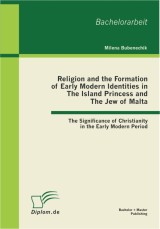Details

Religion and the Formation of Early Modern Identities in The Island Princess and The Jew of Malta: The Significance of Christianity in the Early Modern Period
1. Auflage
|
19,99 € |
|
| Verlag: | Bachelor + Master Publishing |
| Format: | |
| Veröffentl.: | 01.02.2015 |
| ISBN/EAN: | 9783863415051 |
| Sprache: | englisch |
| Anzahl Seiten: | 50 |
Dieses eBook enthält ein Wasserzeichen.
Beschreibungen
This study depicts the significance of Christian and non-Christian relations in the formation of early modern identities in John Fletcher's The Island Princess and Christopher Marlowe's The Jew of Malta. Christian and non-Christian relations are explicitly demonstrated in the Elizabethan and Jacobean plays due to their incorporated issue of religion. The plays are set in the early modern period, during which many changes occur. The significance of Christian and non-Christian relations increase as the age of colonisation advances, and more territorial expansion and long-distance trade are undertaken. The encounter with different cultures and faiths awakes European consciousness to the existence of great non-Christian societies. This knowledge in turn evokes apprehension of the existing attitudes and beliefs in Christian Europe. Notions of race and religion begin to shift. Non-European peoples commence to be perceived as rivals to Christianity. Marlowe's and Fletcher's plays depict the anxieties towards the Other, where religion becomes the central issue of distinction. Marlowe's tragedy The Jew of Malta deals with Judaism and Catholicism and their mutual hostility. Fletcher's tragi-comedy The Island Princess deals with the pagan princess's conversion to Christianity. This study explores various aspects influenced and sustained by Christianity. Christian beliefs form a foundation for early modern European society. The emerging identities are indispensably intertwined with Christianity and Christian attitudes of that time. Notions of race and gender cannot be easily defined without religion. This study explores the changes in the development of racial thinking and its religious underpinning. Christianity inevitably influences different spheres of social life and conduct because of its popularity during this time period. Religion empowers European nations to endorse their values in foreign territories and advocates the spread of Christianity in the world. The Island Princess, for example, explores underlying Christian values, which set the heroine's conversion in the centre of the play. The Jew of Malta, on the other hand, explores the notion that Christians are not flawless. Not only does it reveal the condemned character traits of the Jews, but it also ridicules the Christians. The study investigates the emergence of Christians' repulsive attitudes towards the Jews, the relationship to the Turks, and it explores Marlowe's criticism of the Christians. The study inquires into the causes for the tense relationship to non-Christians and looks for clues in the unconverted natives' perception of Christian Europeans.


















